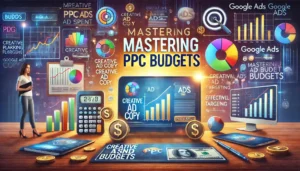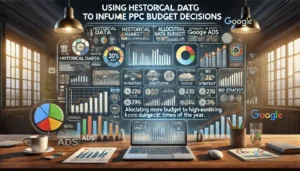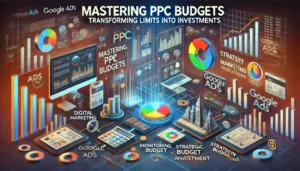Mastering PPC Budgets: Transform Spending Limits into Impactful Investments

Mastering PPC Budgets: In the fast-paced world of Pay-Per-Click (PPC) advertising, where every penny counts, mastering your budget is the key to unlocking success. Sure, creative ad copy and strategic targeting are essential, but without an effective budget plan, your campaigns could fizzle out before reaching their full potential.
This blog equips you, the aspiring PPC pro, with the knowledge and strategies to transform your budget from a simple spending limit to a powerful tool for maximising impact.
Key Takeaways
- Effective PPC budget management begins with a deep understanding of your campaign goals and market dynamics, ensuring that every dollar spent contributes to meeting your objectives.
- Prioritising high-performing campaigns ensures efficient use of resources, allowing you to invest more in what works best and reduce spending on less effective areas.
- Regular monitoring and analysis of campaign performance are essential for making informed adjustments to your PPC strategy, maximising return on investment.
- Utilising advanced budgeting techniques, such as smart bidding strategies and automated control systems, can provide a competitive edge in managing your PPC investments.
- Adapting to market dynamics and adjusting budgets in real-time helps you stay ahead of industry pricing shifts and capitalise on potential opportunities.
Setting Clear PPC Goals and Understanding Your Audience
Defining Campaign Objectives
Defining your goals is essential when measuring your PPC campaign success. Whether it’s to generate more leads, increase your website and social media page traffic, boost your online sales, or raise brand awareness, having precise goals helps you make data-driven decisions and keeps you focused. Remember that your PPC advertising objectives and goals influence key performance indicators and campaign structures.
Identifying Target Demographics
Provide clear visibility to your customers by aligning each strategy with their pain points or goals. Differentiate their needs from what your competitors offer and create ad copy that not only captures their interest but also fulfils their requirements. Furthermore, customising your advertising approach will ensure that you reach your target audience, thereby increasing the likelihood of converting more customers.
Analysing Competitor Strategies
Understanding your competitors’ strategies is crucial for staying ahead in the PPC game. Conduct a thorough PPC audit to identify what keywords and ad copies your competitors are using. This will help you refine your own strategies and allocate your budget more effectively. Regular monitoring and analysis of campaign performance are essential for making informed adjustments to your PPC strategy.
Mastering PPC Budgets: Strategic Budget Allocation for Maximum ROI
Prioritising High-Performing Campaigns
To maximise your ROI, it’s crucial to prioritise high-performing campaigns. Allocate more budget to campaigns that consistently deliver strong results. This ensures that your resources are being used efficiently, driving better returns. Regular profitability analysis helps in identifying these high-performing areas. If certain keywords or ad groups consistently underperform, reallocating their budget can improve overall campaign success.
Balancing Brand and Non-Brand Keywords
Balancing your investment between brand and non-brand keywords is essential. Brand keywords often have higher conversion rates but can be more expensive. Non-brand keywords, while potentially cheaper, may require more effort to convert. A balanced approach ensures that you capture both high-intent traffic and broader audience interest. This strategy helps in maintaining a steady flow of conversions while managing costs effectively.
Allocating Across Platforms
Effective allocation across different platforms can significantly impact your campaign’s success. Each platform has its unique audience and strengths. For instance, Google Ads might be excellent for search intent, while social media platforms like Facebook or LinkedIn can be better for audience engagement and brand awareness. By diversifying your budget across multiple platforms, you can leverage the strengths of each to maximise your overall ROI.
Efficient budget allocation is not just about spending less but investing wisely to achieve the best possible returns.
Leveraging Historical Data for Informed Budgeting
Analysing Past Performance
Historical data informs future budget decisions in PPC campaigns. It shows what worked and what didn’t in past campaigns. By identifying patterns and trends, advertisers can adjust their strategies for better results. This data guides bid strategy adjustments too. If certain keywords consistently perform well at specific times of the year, you’ll want to allocate more budget there during those periods.
Identifying Key Metrics
The starting point for making your PPC budget work harder is diving into your historical performance data. The more accurate and cleaner that data is, the more effective you’ll be. But even if your past performance data isn’t perfect and has some holes in it, you can still get a lot of valuable insight from it by interrogating it closely.
Adjusting Based on Insights
Dynamic budgeting takes this concept to heart by allowing you to allocate your budget based on real-time performance data. Instead of sticking to a fixed budget that may not reflect current trends or opportunities, dynamic budgeting enables you to invest more heavily in campaigns that are driving results and scale back on those that aren’t performing as well.
Identifying opportunities for growth is crucial. Budget is not just a financial management tool, but a method of increasing leads and sales. For example, if you’re spending £X with a positive ROI, what will happen if you double that budget?
Advanced Budgeting Techniques for Competitive Edge
Utilising Smart Bidding Strategies
Smart bidding strategies leverage machine learning to optimise your bids for conversions or conversion value in every auction—a feature known as “auction-time bidding.” By using these strategies, you can ensure that your budget is being spent efficiently, targeting the right audience at the right time. This approach can significantly enhance your ROI by focusing on high-intent users who are more likely to convert.
Implementing Ad Schedules
Ad scheduling allows you to control when your ads appear, ensuring they are shown during peak times when your target audience is most active. This technique helps in maximising the impact of your budget by concentrating spend during high-traffic periods. For instance, if your data shows that conversions are higher during weekdays, you can allocate more budget to those days and reduce spend on weekends.
Exploring Automated Control Systems
Automated control systems can dynamically adjust your budget allocation based on real-time performance data. Instead of sticking to a fixed budget, these systems allow you to invest more in high-performing campaigns and scale back on those that aren’t delivering results. This dynamic approach ensures that your budget is always aligned with current market opportunities, providing a competitive edge.
Leveraging advanced budgeting techniques can transform your PPC campaigns from merely functional to highly competitive, ensuring you get the most out of every dollar spent.
Adapting to Market Dynamics
Monitoring Industry Pricing Shifts
Reacting to industry pricing shifts is vital for PPC budget management. As prices fluctuate, your budget needs adjustment too. This ensures you’re not overspending or underinvesting in potential opportunities.
Adjusting Budgets in Real-Time
In the dynamic world of digital marketing, change is the only constant. Budgeting empowers you to adapt and optimise. If a particular ad or keyword isn’t performing as expected, you can reallocate funds to high-performing areas. Ultimately, fine-tuning your marketing strategy in real-time.
Staying Ahead of Market Trends
Adapting to new competitor strategies also plays a crucial role. When competitors launch aggressive campaigns, it might be wise to reassess your approach. Perhaps shifting focus or increasing the budget on certain keywords could keep you competitive.
Lastly, updating budgets based on market demand changes is essential. If demand for products increases during specific seasons, adjusting the budget accordingly can maximise returns.
Success in the ever-evolving online marketplace requires continuous adaptation and strategic budget management.
Targeting and Engaging the Right Audience
Selecting Effective Keywords
Choosing the right keywords is crucial for the success of your PPC campaigns. Effective keyword selection ensures that your ads are shown to users who are actively searching for your products or services. Utilise tools like Google Keyword Planner to identify high-performing keywords and consider long-tail keywords for more specific targeting.
Understanding Audience Behaviour
To engage your audience effectively, you need to understand their behaviour. Analyse data from previous campaigns to identify patterns and preferences. This will help you tailor your ads to meet the needs and interests of your target audience. Google ads agencies often use advanced analytics tools to gain deeper insights into audience behaviour.
Covering All Stages of the Consumer Funnel
It’s essential to target users at different stages of the consumer funnel. Create campaigns that address the needs of users at the awareness, consideration, and decision stages. This approach ensures that you are engaging potential customers throughout their entire journey, increasing the likelihood of conversions.
By understanding and targeting the right audience, you can significantly improve your campaign effectiveness and ensure efficient budget utilisation. This precision targeting ensures that your ads are shown to a more relevant audience, which is more likely to engage with your content and take desired actions, such as making a purchase or signing up for a newsletter.
Continuous Monitoring and Adjustment
To help with truly mastering PPC budgets, continuous monitoring and adjustment are non-negotiable. Regular performance reviews are essential for making informed adjustments to your PPC strategy, allowing for real-time optimisation. This ongoing process ensures that your strategy remains effective and adaptable to changing market dynamics and customer behaviours.
Regular Performance Reviews
Regularly review PPC performance data to refine and improve your overall digital marketing strategy. This data enables you to assess your PPC campaign performance and adjust where necessary. Check performance metrics like conversion rate, click-through rate (CTR), and return on ad spend (ROAS).
Making Data-Driven Decisions
Utilise various analytical tools to assist you in identifying areas that need improvement and tracking your results. Adjusting your budget in response to market dynamics and consumer behaviour trends can help maintain or improve campaign effectiveness over time.
Experimenting with New Strategies
An effective management routine includes monitoring your campaign performance, adjusting bids, adding negative keywords to filter out unwanted traffic, and refining target keywords based on the data you collect. It’s important to keep an eye on key metrics like the Advertising Cost of Sales (ACoS) and to understand the relationship between spending and sales to ensure your campaigns are performing optimally.
Automated control tools monitor budgets without constant manual oversight. They implement rules-based adjustments based on predefined criteria. This ensures adherence to set budget limits while optimising campaign performance.
Conclusion
Mastering PPC budgets is not just about setting spending limits; it’s about transforming those limits into impactful investments. By understanding your goals, analysing market dynamics, and strategically allocating your budget, you can ensure that every dollar spent contributes to your campaign’s success. Regular monitoring and adjustments are crucial to stay ahead in the ever-evolving digital landscape. Embrace the strategies and insights shared in this article, and you’ll be well on your way to turning your PPC campaigns into powerful tools for achieving your marketing objectives. Ready to take control and make every penny count? Let’s get clicking!
Frequently Asked Questions on Mastering PPC Budgets
What is PPC budget management?
PPC budget management involves strategically allocating and monitoring your pay-per-click advertising spend to maximise return on investment. It’s about investing wisely rather than just curbing expenses.
How do I allocate my PPC budget effectively?
Start by setting clear goals, then distribute funds based on campaign performance and market research. Think of it as dividing a pie – you want the biggest pieces going to the most profitable parts of your strategy.
Can optimising campaign performance help in budget management?
Yes, optimising campaign performance through techniques like smart bidding, ad schedules, and historical data analysis can help manage budgets effectively while aiming for maximum impact.
Why is understanding my target audience important for PPC budgeting?
Understanding your target audience’s demographics, online behaviour, and search habits helps inform your bidding strategy and budget allocation, ensuring your ads reach the right people and deliver better results.
What role does historical data play in PPC budgeting?
Historical data provides valuable insights into past campaign performance, helping you identify key metrics and adjust your budget based on what has worked well and what hasn’t.
How can I stay ahead of market trends in PPC advertising?
Staying ahead of market trends involves regularly monitoring industry pricing shifts, adjusting budgets in real-time, and being adaptable to changes in the market to ensure your campaigns remain competitive.
Author
Search Blog
Free PPC Audit
Subscribe to our Newsletter
The Voices of Our Success: Your Words, Our Pride
Don't just take our word for it. With over 100+ five-star reviews, we let our work-and our satisfied clients-speak for us.
"We have been working with PPC Geeks for around 6 months and have found Mark and the team to be very impressive. Having worked with a few companies in this and similar sectors, I rate PPC Geeks as the strongest I have come across. They have taken time to understand our business, our market and competitors and supported us to devise a strategy to generate business. I value the expertise Mark and his team provide and trust them to make the best recommendations for the long-term."
~ Just Go, Alasdair Anderson




